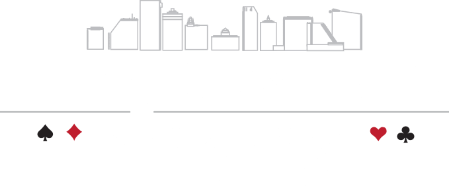Matthew Mason and Melissa Mould are 33 and 31 years old, which makes them an extremely attractive couple to the modern casino industry.
Gaming executives are worried about how to draw people like Mason and Mould, who are part of the millennial generation born between 1982 and 2000, to replace the older generations they know they will eventually lose.
The stakes are enormous. Millennials number 75.4 million and last year overtook baby boomers as America’s largest generation, census data show. Their buying power, which ranges as high as $2.5 trillion, is also expected to overtake the boomers’ by 2020.
So casinos all over, including those in Atlantic City, are trying all sorts of ways to get millennials onto their floors or gambling online.
Resorts Casino Hotel combines those live and virtual forms of gambling with one idea, a room just off the casino floor that the casino calls its I-Gaming Lounge. And that’s where Mason and Mould — residents of Atlanta who like to travel and gamble — found themselves one day last weekend, playing blackjack on a touchscreen big enough to show the Super Bowl in some sports bars.
A few steps away and a bit earlier, Kevin O’Neil and Sierra Cichonski, both Philadelphians in their 20s, relaxed on a couch as they played blackjack — one of a deck of games gamblers can bet on in the lounge. Earlier, the pair did a just-for-fun test of “Foxin’ Wins,” a new game available only with Resorts.
The I-Gaming Lounge has several features to address trends that Chris Davidson, from the travel-marketing firm MMGY Global, highlighted to the crowd at a session on millennial gamblers at the recent East Coast Gaming Congress at Harrah’s Resort.
The Resorts lounge has couches, and 86 percent of young gamblers told MMGY’s researchers that “social gaming” areas were important in their decision on where to play. Just 55 percent of older players said they cared about seeing them in a casino.
Eighty-seven percent of millennials also said they want skill-based games — such as the video games much of their generation handles almost as natural appendages. But of older players, only 54 percent wanted to play those games, which some developers see as a key to turning younger people into steadier customers.
“This is a generation that grew up with video-game systems that exceed what they can find in most casinos,” Davidson said.
Ed Andrewes, a consultant who manages Resorts Digital Gaming, estimates the average age of customers in the I-Gaming Lounge is under 30. A quick look out at the casino floor confirms that those millennials at the video screens are far younger than the typical player at the slots or tables.
Resorts is trying some new, video-element games in its internet lounge and online, but Andrewes argues that games will always need an element of luck to appeal to a broad market.
“If there’s too much skill involved, a few players will win small amounts of money from lots of bad players,” Andrewes says, which has the effect of driving all those losing players to another game — one they think gives them a chance to win.
To him, the real business advantage of the internet lounge is showing customers they can gamble legally on their phones or tablets, and do that at home with Resorts. Despite widespread local publicity about online gambling, even many young players still don’t know the games are available, said Ken Adams, another Resorts executive.
He said blackjack, a classic casino game, is always popular in the lounge, partly because those customers seem to feel more comfortable trying it there than they do next to older players at the nearby tables.
“You get a lot of people in here betting a dollar on blackjack,” Adams added.
But it’s not just gambling that can draw these customers to a casino.
“Millennials go out to eat twice as much as older customers,” Dana Takrudtong, of GAN, an online gaming operation, told the millennial session at Harrah’s.
But young people may also eat differently, she said, joking that she was still searching Atlantic City’s restaurants to find almond milk, a mainstream-supermarket staple these days.
These customers also like to travel in crowds, with arrangement assistance from social media.
“In my generation, it was hard for three or four of us to meet up,” said Andrewes. “Now, they have 20 of them meet up.”
He believes the basic, classic casino games are solid enough that younger players will eventually see the appeal. But Andrewes agrees casinos have to offer the right atmosphere, amenities and attractions, such as entertainment and clubs, to get millennials in their doors in the first place.
Victor Rocha, an Indian gaming veteran and editor of the Pechanga.net website, got laughs at the recent millennial gambling session with his thumbnail summary of how the industry and these hotly desired new customers will eventually hook up.
“I believe millennials, like the rest of us, will get on with our lives,” he said, grinning. “And when the kids grow up and you get older and you hate each other, you’ll go to the casino.”
